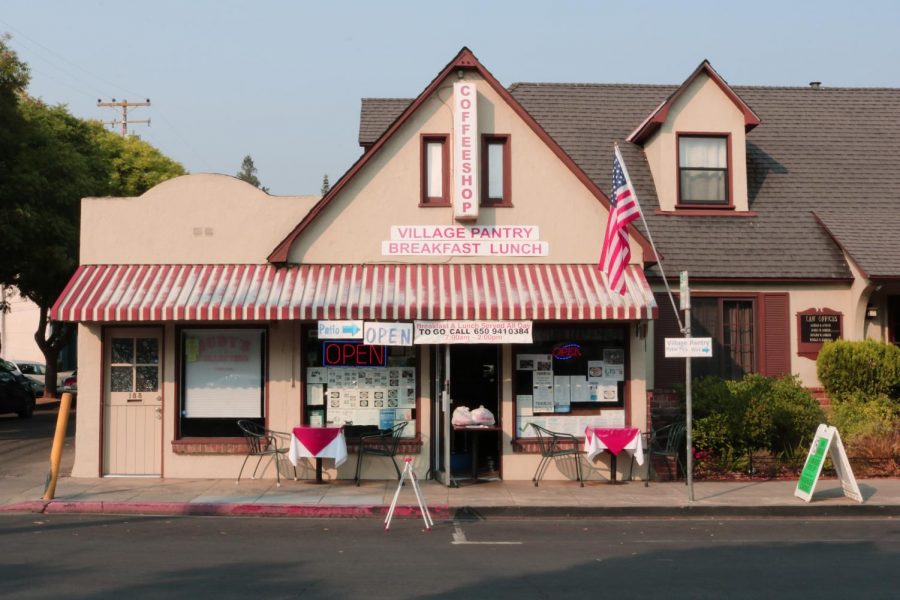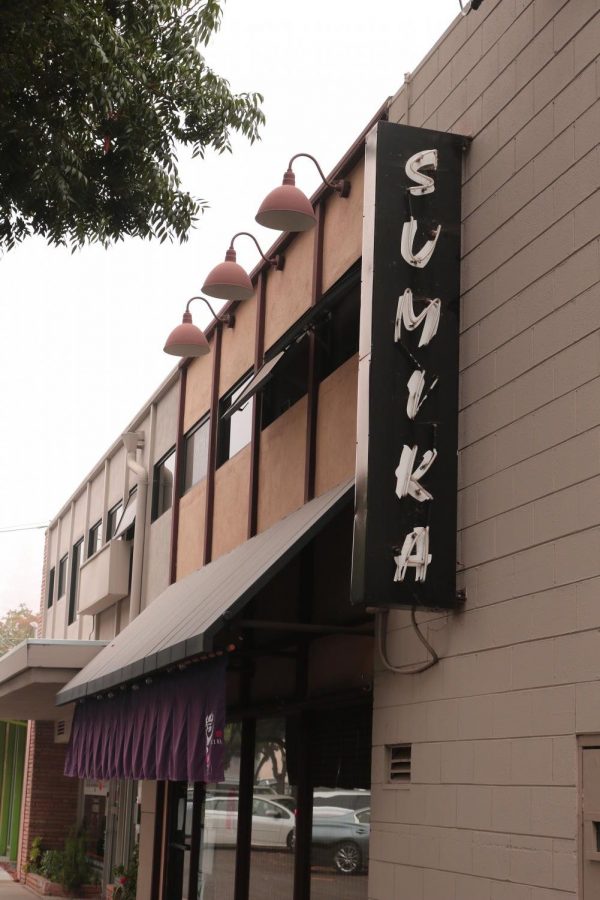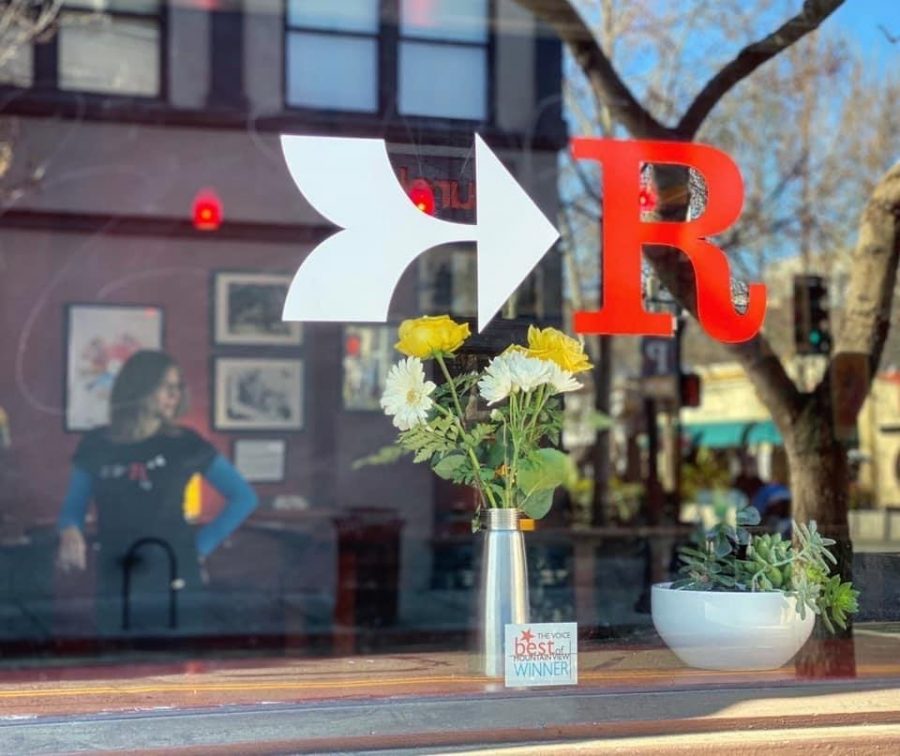A small taste of what’s on an eatery owner’s plate
September 13, 2020
As far as small businesses go, restaurants have been hit the hardest during the pandemic with previously regular customers choosing to eat in, mass lay-offs of staff and changing safety regulations. The Talon interviewed a few local eateries in Los Altos and Mountain View to figure out what it truly takes to run a business in one of the arguably riskiest industries during the quarantine. Continue reading to learn about how Village Pantry, the Ogiku Corporation and Red Rock Coffee are managing to stay afloat during the pandemic.
Village Pantry
Village Pantry co-owners Julie and David Ogilvie have served homestyle American food to their patrons in Downtown Los Altos for the past two decades. Although the restaurant faces many financial challenges due to the pandemic, the Ogilvies are determined to keep its doors open due to endless support from their customers.
For the past 20 years, the classic diner-style decor inside Village Pantry has provided customers with a trip down memory lane. Co-owned by David and Julie Ogilvie and nestled in the heart of Downtown Los Altos, The Village Pantry is a homey restaurant serving old-fashioned American comfort food seven days a week.
After moving to the United States from Taiwan, Julie started the restaurant due to her love for cooking and the desire to replicate the American food she tried. She found American food to be easy to experiment with, adding her own creative touches to different dishes.
“I just go out and eat, and I think about what’s inside,” Julie said. “Immediately, I go home and cook another meal similar to what I ate to see if I can do it. Every time, it comes out even better.”
Along with creating original recipes, Julie prioritizes the freshness and quality of her food. After working at the restaurant every day, she heads to the grocery store to buy fresh produce for the next. Her nights are spent baking biscuits, squeezing fruit juice and making homemade jams.
“The customers and I are just like friends,” Julie said. “If there is something on the menu that they cannot eat, I will make it for them and try to get creative.”
Conversing over experiences from World War II to childhood memories, customers can feel like they’re in their living room while at the restaurant.
“Older customers can talk about what they’ve been through and things I didn’t even know about,” David said. “I say that’s a very good story, and they say that’s not a story, it’s real. This restaurant is like a family. Anybody can talk about their good news or bad news and we’ll help each other. That’s how strong we are.”
According to Los Altos High School senior Grace Patterson, Village Pantry’s homey environment is apparent as soon as you walk in.
“She has pictures of all of her customers on the walls and keeps every little trinket that she receives,” Grace said. “Walking in there, you really feel the community and the spirit of the restaurant that a lot of new restaurants are missing.”
Priding themselves on their tight-knit customer environment, David and Julie recently opened the back patio to provide customers with a similar experience in the fresh air.
“The norm was that we would sit next to the customer, joke with them, talk to them, but now, you can’t do that when everything is from a distance,” David said.
The pandemic has made it difficult for the Village Pantry staff to keep close connections with many of their regulars stuck at home. Even though they’re unable to visit the restaurant, an outpour of customers offered donations and support to their beloved restaurant.
“People have been buying gift cards and we don’t even ask,” David said. “They’ll come or send letters in the mail with checks inside saying they want us to stay. Finding out people genuinely want us to be here and continue our work has been surprising to us.”
Thanks to the support from their customers, Julie and David have opened the restaurant for pick-up and seating in the outdoor patio. They are happy to catch up with both their regulars and new customers.
“It’s never an awkward silence where everyone is just eating,” LAHS senior Audrey Boennighausen said. “It’s constant conversation and even if it’s your first time there, you feel like you’re a part of that.”
Although the pandemic has made it difficult for the restaurant to stay afloat, Julie will continue to serve piping hot plates of their signature dishes and make her customers feel as at home as possible.
“Her determination and desire to prove to people that she can do it keeps the restaurant going,” David said. “She doesn’t want to let people down. It’s not even in her mindset that she wouldn’t be here.”
Ogiku Corporation
Located in Downtown Los Altos, Sumika Grill is one of the four Japanese cuisine restaurants owned by Kuniko and Gary Ozawa, the parents of Los Altos High School senior Akane Ozawa. During the quarantine, the Ozawas’ business was struck hard by the loss of customers. However, through many adaptations, they are now able to meet the needs of takeout dining and continue serving customers all of their favorite signature dishes.
The closure of restaurant dining during the quarantine was a knockout punch for the dining plans of many families. For Los Altos High School senior Akane Ozawa, whose family owns four Japanese cuisine restaurants, the shutdown hit even harder — it meant huge financial instability.
The Ozawas started the Ogiku Corporation, which consists of two Sumika Grills located in Los Altos and Santa Clara and two Orenchi Ramens located in Santa Clara and Redwood City. Sumika Grill specializes in yakitori, a Japanese style grilled meat, and Orenchi serves ramen.
Although the restaurants are owned by Akane’s parents, Kuniko and Gary Ozawa, all three of the Ozawa children are helping the restaurants through their endless uphill battles. Akane’s older sisters — college students Miyuki and Erika — are both majoring in business, combining their own expertise with that of their restaurateur parents.
More than ever now, running their businesses is a full Ozawa family effort. However, even with the whole family working to support the business, the financial deficits caused by the lack of in-person dining at the start of the shutdown were enormous. The Ozawas were forced to lay off about 90 percent of their employees and close one of their restaurants in San Francisco, leaving them with the four restaurants they have today.
The pressure was especially high for Akane, as the financial uncertainty meant that her family would potentially not be able to afford her college tuition.
“It was hitting us hard,” Akane said. “You have the fear in the back of your head knowing that you’re being relied on to carry the restaurant. My two sisters, parents and I are all working, and even though we’re trying to share the workload as a whole team, it can still feel overwhelming.”
In addition to general financial setbacks from the quarantine, the racial stereotype that all Asian people are associated with the coronavirus exacerbated the situation for the Ozawas, as many patrons refused to order food from their restaurants.
“‘I’ll be wearing gloves. I won’t. infect you,’ Akane said in response to the racial stereotype held by many customers. “I wish that people didn’t really take the racial thing [out of proportion?] just because we’re Asian.”
Despite their initial shock, breaking past stereotypes is something the Ozawas have dealt with before. The very formation of the business began with Kuniko defying her parent’s expectation that she must follow Japanese tradition and become a housewife.
“When my mom came from Japan, she didn’t like working in offices or just staying at home,” Akane said. “So, she created the business with the idea of bringing some Japanese culture to America. She opened up a restaurant and my dad quit his job of being an office worker to become a co-owner.”
With these various challenges laid out in front of them, the Ozawas took to adjusting their business to coronavirus regulations by reinventing their takeout service.
“I was initially freaked out by the lack of customers,” Akane said. “But because my parents are so motivated and innovative, they just kept on going forward and changing things…and the restaurant is slowly evolving to become more and more efficient.”
Now, the Sumika Grills and Orenchi Ramens have set up their interiors specifically designed to handle dining out. The restaurants have also made use of bento boxes, a Japanese style of meal in which different combinations of foods are separated by squares in a box, to sell them to customers looking for a quicker pre-prepared meal.
The Ozawa business may have suffered a hard hit at the start of the pandemic, but it’s efficient adaptations to the status quo have proven that it will take a lot more to knock out this hardy business. Through their unwavering ability to adapt, the Ozawas are proof that even for those businesses struggling through the pandemic, there is still hope.
Red Rock Coffee
Red Rock Coffee in Downtown Mountain View (pictured above) has been a place for numerous Silicon Valley patrons to grab a dark roast and enjoy community held events for 15 years. Nearly having to close their business, Red Rock Coffee continues to bring smiles to the faces of aspiring musicians, knitters, bikers and anyone else who finds a home between its red walls.
Silicon Valley is often criticized for being a tense area, full of stressful business deals and intense academics, but within it, Red Rock Coffee in Downtown Mountain View stands out as a place for everyone to relax and have a good time.
While Red Rock houses coffee nerds and business meetings most days, what makes it special is that it is home to a variety of different clubs and events: it has an Open Mic Night, a knitting club, a gentle biker gang and a coffee-tasting class. Events like these make Red Rock such a wholesome experience, the reason it was purchased by the Highway Community to begin with.
The Highway Community is a denomination-less Mountain View-based church with a passion for truth, authenticity, community and hope. That’s why Red Rock also donates some of its profits to causes the staff care about — most recently, New Creation Home in Palo Alto, an organization dedicated to helping at-risk young mothers become financially independent.
“People want to be connected to something — to someone,” General Manager Jean Boulanger said. “We provide that in lots of ways. We know our regulars, we welcome newcomers to the area, we offer a place to simply be and hang out.”
Red Rock fosters an abundance of communities, from the teenagers who hang out with their friends to the startups writing code in hopes of making the next big thing. The atmosphere is meant to be friendly and safe, and its red walls encourage many to find their place there.
But, as can be expected, Red Rock has suffered from revenue losses since quarantine began and have had to cut down their regular staff. At one point, it was reaching only 20 percent of its earlier sales, but has bounced back since then.
While profits recover, though, many of the events that made Red Rock a local hub cannot be replicated online. One example is the Bootstrappers’ Breakfast. Prior to quarantine, entrepreneurs of all ages would pile into the second story meeting space to share their ideas over coffee; in the past months, though, they haven’t met, even over Zoom. However, some of their groups have met online, including a local ensemble of musicians and artists that gather for their virtual biweekly Open Mic Night.
Despite all these financial setbacks, Red Rock has hit a stroke of luck: fellow Highway Community member Chrissy Mata set up a GoFundMe to help keep the business alive, raising around $94,000.
“She loves Red Rock for lots of reasons — the staff, the events, a good place to work and meet people,” Boulanger said. “Mostly she loves the connections that happen here, how people become known in a sometimes lonely place.”
Christy isn’t alone in her love of Red Rock. Boulanger noted how when Red Rock was struggling, many offered up their hours to their fellow employees who needed the shift more. Among those who love Red Rock are the WhatsApp founders, Jan Koum and Brian Acton.
“Startups feel it’s good luck to work here,” Boulanger said. “Tour buses make stops here to give visitors the chance to see, ‘where WhatsApp was coded.’ So it’s a big deal to some. Frankly, the founders are just nice guys who are funny and polite and nice to have around.”
One of the biggest attractions at Red Rock is its Open Mic Night, where musicians, poets, comedians and illusionists gather for a sense of community and a chance to perform.
“Highway is a very music and media-centered church and I believe it was an outgrowth of that,” Boulanger commented. “Musicians and artists were and are on staff, and they recognized that it would be a powerful way to help people be known, to share their music, their words, their art. I think musicians want to encourage each other, and this is the perfect venue for that.”
Red Rock also hosts a Youth Open Mic Night, which has allowed many Mountain View-Los Altos District students a place to express themselves and have a great time.
“The people there really helped me feel comfortable to perform there, and it really improved my performance skills and confidence,” sophomore Rose Shortland, who performed at the Open Mic Night with her bandmates, said. “My favorite memories are at Red Rock. It just has the best vibes. I don’t know how to explain it.”
Red Rock, from the very beginning, has been a place centered on fostering community — a difficult thing to grasp during quarantine. Despite how difficult times have seemed, Red Rock has provided virtual spaces, and will hopefully be inviting customers, returning and new, through its doors for a dark roast for years to come.







